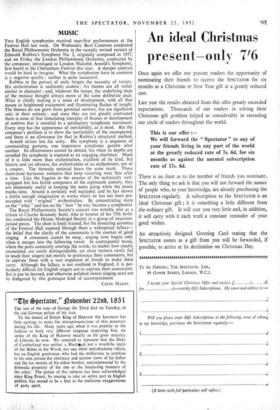MUSIC Two English symphonies received near-first performances at the Festival
Hall last week. On Wednesday Basil Cameron conducted the Royal Philharmonic Orchestra in the recently revised version of Edmund Rubbra's Symphony No. 2, originally composed in 1937, and on Friday the London Philharmonic Orchestra, conducted by the composer, introduced to London Malcolm Arnold's Symphony, first heard at the Cheltenham Festival this year. A sharper contrast would be hard to imagine. What the symphonies have in common is a negative quality ; neither is quite successful.
Rubbra in the pursuit of unity forgets the necessity of variety. His orchestration is uniformly austere ; his themes are all rather similar in character ; and, whatever the tempo, the underlying steps of the musical thought always move at the same deliberate pace. What is chiefly lacking is a sense of development, with all that means in heightened excitement and illuminating flashes of insight. The themes do not grow from germinal motives, but are significant only in their entirety ; and since they are not greatly contrasted there is none of that stimulating interplay of themes or development of motives that is essential to a satisfactory symphonic movement. Every step has the appearance of inevitability, as it must: But the composer's problem is to show the inevitability of the unsuspected, and there is no allowance for that in Rubbra'§ structural method. Arnold strives less for unity. His symphony is a sequence of commanding gestures, one impressive symphonic gambit after another. Its effectiveness cannot be denied, but when its depths are sounded the symphony is exposed as an engaging charlatan. Much of it is little more than orchestration, excellent of its kind, but bizarre and yet obvious, the orchestration of an orchestrator, not of a creator. The thematic material bears the same mark. Those short-lived harmonic ostinatos that keep recurring wear thin after a time. Like the fugatos in the sonatas of the technically well- equipped but less fertile composers of the eighteenth century, they are immensely useful in keeping the notes going while the music marks time. Arnold is certainly well equipped, and he has shown a fertile enough imagination in works where he has not been pre- occupied with " original " orchestration. By concentrating more on the " *hat " and less on the how " he may become a symphonist.
The Royal Philharmonic Society's concert was notable also as a tribute to Charles Kennedy Scott, who in honour of his 75th birth- day conducted the Oriana Madrigal Society in a group of unaccom- panied pieces. The choir is finely trained, but the dissecting acoustics of the Festival Hall exposed through them a widespread fallacy— the belief that the clarity of the consonants is the essence of good singing. A consonant cannot be sung ; singing tone begins only when it merges into the following vowel. In contrapuntal music, where the parts constantly overlap, the words, no matter how clearly enunciated, are rarely distinguishable, yet choir trainers rarely fail to teach their singers not merely to pronounce their consonants, but to aspirate them with a vast expulsion of breath to make them carry. Although the fallacy is not confined to England, it is par- ticularly difficult for English singers not to aspirate their consonants. But it can be learned, and otherwise polished choral singing need not be disfigured by this grotesque kind of accompaniment.
COLIN MASON.


































 Previous page
Previous page